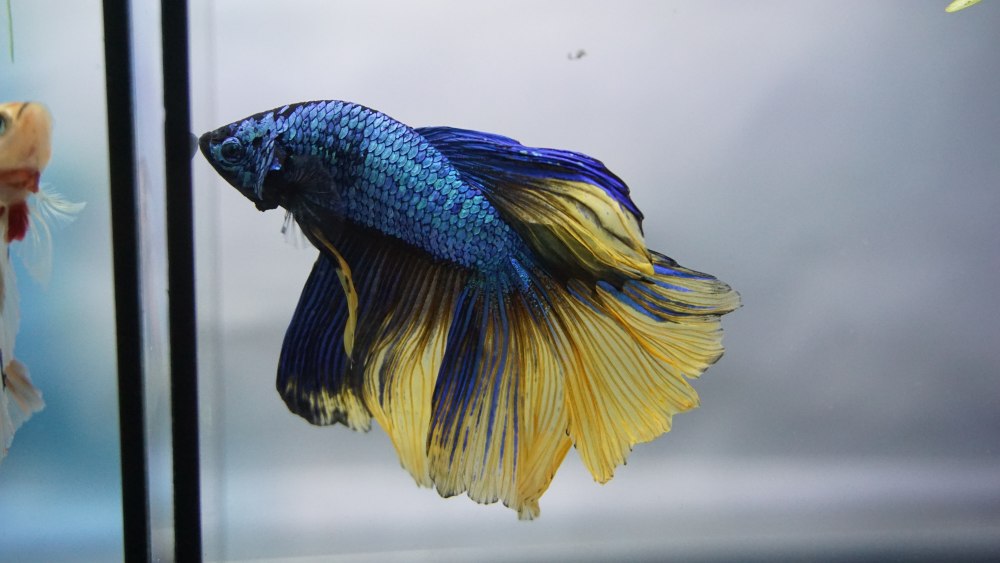Have you ever wondered whether your betta fish can hear you when you talk to them? It’s an intriguing question that has captivated many pet owners.
After all, it would be amazing if our beloved fish could understand us and appreciate the conversations we have with them.
In this article, we will explore the answer to this burning question: Can betta fish hear your voice? We will take a look at scientific research on hearing in bettas and discuss how their senses compare to other animals.
We’ll also share tips for talking to your betta so they can feel heard (or maybe even understood!) by their human companions. So if you’re curious about what kind of listening skills your favorite finned friend might possess, keep reading!

Do Betta Fish Have Ears?
It may sound strange to ask if betta fish have ears, as we know that humans and animals alike rely on their sense of hearing for communication. But in the case of these beautiful aquatic creatures, it’s not so clear cut!
Although they don’t possess traditional ear structures like those found in mammals, betta fish are surprisingly sensitive to vibrations and sounds in the water around them. Surprisingly enough, this means that yes – your voice can be heard by a betta fish!
Betta fish have an amazing ability to detect sound waves through specialized cells located inside their head called ‘lateral lines’. These lateral lines are connected directly to the inner ear and help betta fish interpret underwater noise such as tiny bubbles or even movement from other nearby objects.
This remarkable adaptation allows them to detect predators before they become visible or audible – giving them a better chance at survival in their challenging environment!
By studying how betta fish respond to different frequencies of sound, researchers have discovered that these little swimmers actually recognize human voices. They can differentiate between familiar individuals who regularly interact with them versus unfamiliar ones – showing us just how incredibly attuned these incredible creatures really are.

How Do Betta Fish Hear?
Betta fish are fascinating creatures, and it’s natural to be curious about how they experience their environment. One of the key senses that betta fish rely on is hearing, so can betta fish hear your voice?
Betta fish have sensitive ears located near their gills and eyes which allow them to pick up sound waves from both inside and outside of the water.
Here’s what you need to know about how betta fish hear:
- They possess a unique inner ear structure which allows them to detect low frequency vibrations in the water.
- Their hearing range covers anywhere from 25 Hz to 1 kHz, compared with humans who can hear up to 20 kHz.
- Betta fish use this sense primarily for navigating their environment or communicating with other bettas nearby.
- They also may respond when they recognize familiar sounds, such as someone speaking their name or tapping around the tank.
It may surprise some people that these small animals have such an impressive ability to discern sound signals within their environments. With proper care, betta fishes’ acute hearing abilities will remain strong throughout their lives – allowing them to navigate through any challenges life throws at them.

Can Betta Fish Hear Human Voices?
The previous section highlighted the fascinating capabilities of betta fish hearing. The question remains, however: can these creatures hear human voices?
In short, the answer is yes; bettas can indeed pick up on sound waves produced by a human’s voice. Human speech sits in the range of frequencies that bettas are most sensitive to, falling between 400 and 2000 hertz—the same range as birdsong or crickets chirping.
Betta fish have also been known to recognize their owners’ voices over time. After all, if you talk to your pet every day for long enough, eventually it will become familiar with your intonation and cadence!
Moreover, there is evidence that suggests bettas might even react differently when they recognize particular words within a conversation. For instance, some keepers report that their pets begin swimming around excitedly whenever they say certain phrases like “Let’s go swimming!” Ultimately, this indicates how attuned betta fish are to human communication.

Do Betta Fish React To Sounds?
Betta fish have a good sense of hearing and can hear low-frequency sounds, so they’re likely to react to sounds. They may startle when they hear a loud noise, or they may be drawn to a quieter sound.
When it comes to vocal recognition, betta fish may recognize different tones, like a soothing voice or a playful one. It’s even possible they can learn to recognize a specific person’s voice. It’s hard to know for sure, but betta fish may even respond to their name if they’re used to hearing it.
Regardless, it’s clear that betta fish can react to sound and may even recognize certain voices.
Betta Fish Hearing
Betta fish, or Siamese fighting fish, have ears located on the side of their head near their gills which allows them to detect vibrations in the water. But can betta fish actually hear your voice?
Recent studies suggest that betta fish are able to recognize certain sounds and react accordingly. Researchers found that when presented with a noise at a certain frequency, such as a whistle or low tone, the betta fish responded by swimming towards it. This suggests they not only heard the sound but were also attracted to it.
In addition, researchers discovered that when exposed to loud noises for long periods of time, the betta fish became agitated and fearful.
Though more research is needed before any definitive conclusions can be drawn about how well betta fish hear and respond to sounds, these initial findings offer some insight into this fascinating topic. From what we know so far, it appears that betta fish may indeed be capable of responding to our voices – though perhaps not always in ways we’d want them too!
Sound Reactions
It’s clear that betta fish can hear and respond to sound, but do they react differently depending on the type of noise?
Well, it turns out that different sounds can elicit different reactions from these curious creatures. For example, when exposed to a low-pitched whistle or tone, betta fish have been known to swim towards the source of the sound. On the other hand, loud noises tend to cause fear and agitation in betta fish.
So what does all this mean for us humans trying to interact with our finned friends? It could be helpful to learn which types of noises trigger positive responses versus negative ones so we know how best to communicate with them. Additionally, it may also be beneficial to keep noise levels at an appropriate level when around these sensitive animals as too much sound can make them uncomfortable.
Overall, research into betta fish responses to sound is still ongoing and more studies will need to be conducted before any solid conclusions are drawn. However, based on current findings it seems likely that betta fish can recognize and respond to certain sounds – perhaps even your own voice if you’re lucky!
Vocal Recognition
Interestingly, recent studies have suggested that betta fish may even be able to recognize vocal cues. This means they could potentially identify their owners by voice and respond accordingly!
To test this theory, researchers conducted experiments where human voices were played for the fish over a period of time. The results showed that after being exposed to a certain individual’s voice repeatedly, the bettas would often swim closer when hearing it again – suggesting some form of recognition and familiarity.
These findings are quite remarkable as previously thought impossible for most aquatic animals. It also suggests there is more complexity in the way these creatures interact with sound than we initially realized.
With further research into vocal recognition in betta fish, perhaps one day we’ll be able to have meaningful conversations with our scaly friends!
Overall, while much remains unknown about how exactly betta fish hear and process sounds, current evidence shows us these vibrant creatures can indeed react differently depending on what type of noise is presented. From low-pitched tones triggering positive responses to recognizing familiar voices, betta fish seem capable of understanding more than we ever imagined!

What Kind Of Sounds Do Betta Fish Like?
Surprisingly, betta fish can hear your voice! But what kind of sounds do betta fish like?
Research suggests that they may prefer higher-frequency sounds over lower frequencies. They also enjoy hearing human voices, as this gives them a sense of familiarity with their owners. Additionally, certain musical instruments such as xylophones or flutes have been known to produce positive effects on these aquatic creatures.
So how does all this affect our own interactions with bettas?
Well, talking softly to your pet can help calm them down and make them feel secure. It’s important not to shout or create too much noise when interacting with them though – otherwise, it could startle or distress them. As long as we remember to keep things at a low volume level and stick to soothing tones, we can safely engage with our beloved pets in a way that benefits both us and them alike.

How Far Away Can Betta Fish Hear?
Betta fish are renowned for their sensitive hearing, but how far away can they detect sound? While the exact range varies between species, some studies suggest that betta fish possess sensitivity to noises up to two meters away.
Here is a breakdown of what makes betta fish’s hearing so acute:
- Betta fish have highly developed inner ears which contain sensory cells capable of detecting low-frequency sounds.
- They also have an organ called the Weberian apparatus which amplifies and transmits sound across long distances.
- The lateral line system on their body allows them to sense vibrations in water, making it easier for them to locate food sources or potential predators.
- Their eyesight is relatively poor and relies more heavily on auditory cues than visual ones.
- Lastly, betta fish are equipped with specialized barbels located near their mouths that help them identify prey by taste and smell as well as sound.
All these features make it possible for betta fish to hear your voice from even greater distances than you might imagine! With proper care and a healthy environment, your pet will be able to recognize and respond to sounds emitted from anywhere within its vicinity.

How To Talk To Your Betta Fish
The voice of a loving owner can be like music to the ears of their beloved pet betta fish. As humans, we take for granted our ability to communicate with one another through words and sounds; however, for these colorful little creatures, it’s much more difficult as they do not possess this same gift.
Yet despite the lack of verbal communication between us, there are still ways that we can express ourselves and build a relationship with our underwater friend. Using soft tones and gentle motions you can evoke a feeling of comfort in your furry companion.
When speaking to your betta fish try using short phrases or just simply say its name – ‘Bubbles’ or ‘Goldie’, whatever you may have named them! It might sound silly but even if they don’t understand what is being said they will pick up on certain qualities of your voice such as calmness or excitement which could make all the difference when interacting with them.
You should also keep in mind something important: silence speaks volumes too. Take time out each day to sit quietly near the tank and observe their behavior without any noise distraction from outside sources like TV or radio – doing so will create an environment where both parties feel comfortable enough to connect without either party having to push themselves beyond their own boundaries.
Conclusion
Betta fish are an incredibly fascinating species of fish, and one that many people have kept as pets for decades. But can these colorful creatures actually hear your voice?
While betta fish do not have true external ears like humans do, they still possess some hearing capabilities. Studies suggest that betta fish can detect vibrations in the water from sound waves created by noises such as talking or singing. However, it is unlikely that betta fish can differentiate between different types of sounds or recognize individual voices.
So although we may never know for sure if our beloved aquatic friends can understand us when we talk to them, there are plenty of other ways to show them love! Here are just a few ideas:
• Give them lots of attention – spend time staring into their tanks and watching them swim around and explore.
• Provide frequent cleanings – keep their tank fresh so they always have access to healthy water conditions.
• Feed them nutritious foods – provide your betta with high quality food full of essential vitamins and minerals.
• Switch up their environment– add decorations, plants, or toys occasionally to make their home more interesting.
No matter what type of relationship you decide to build with your betta fish friend, it’s important to remember that they are living beings who deserve respect and kindness – just like any other pet!
